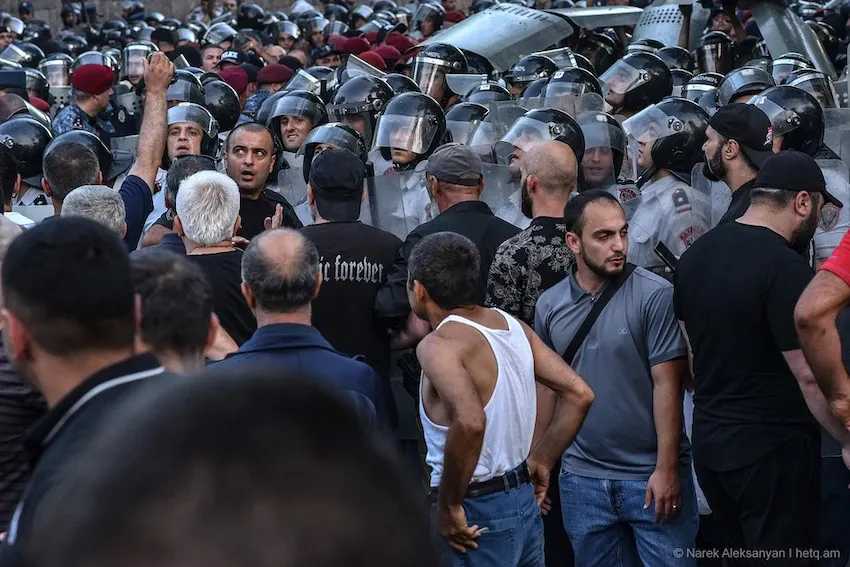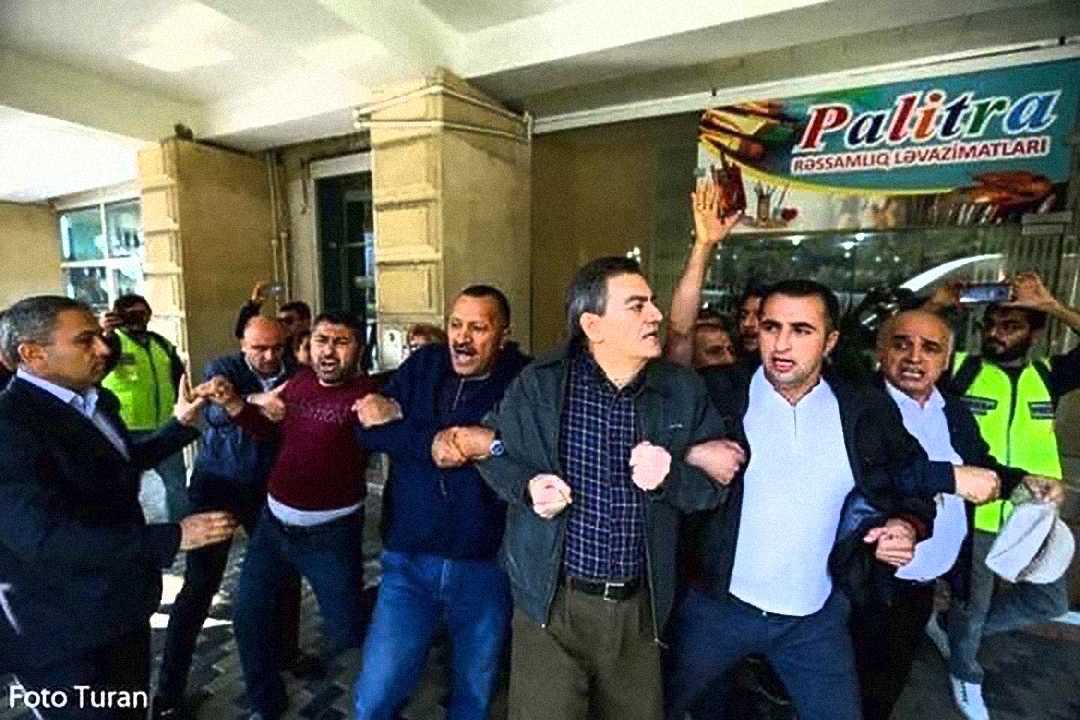
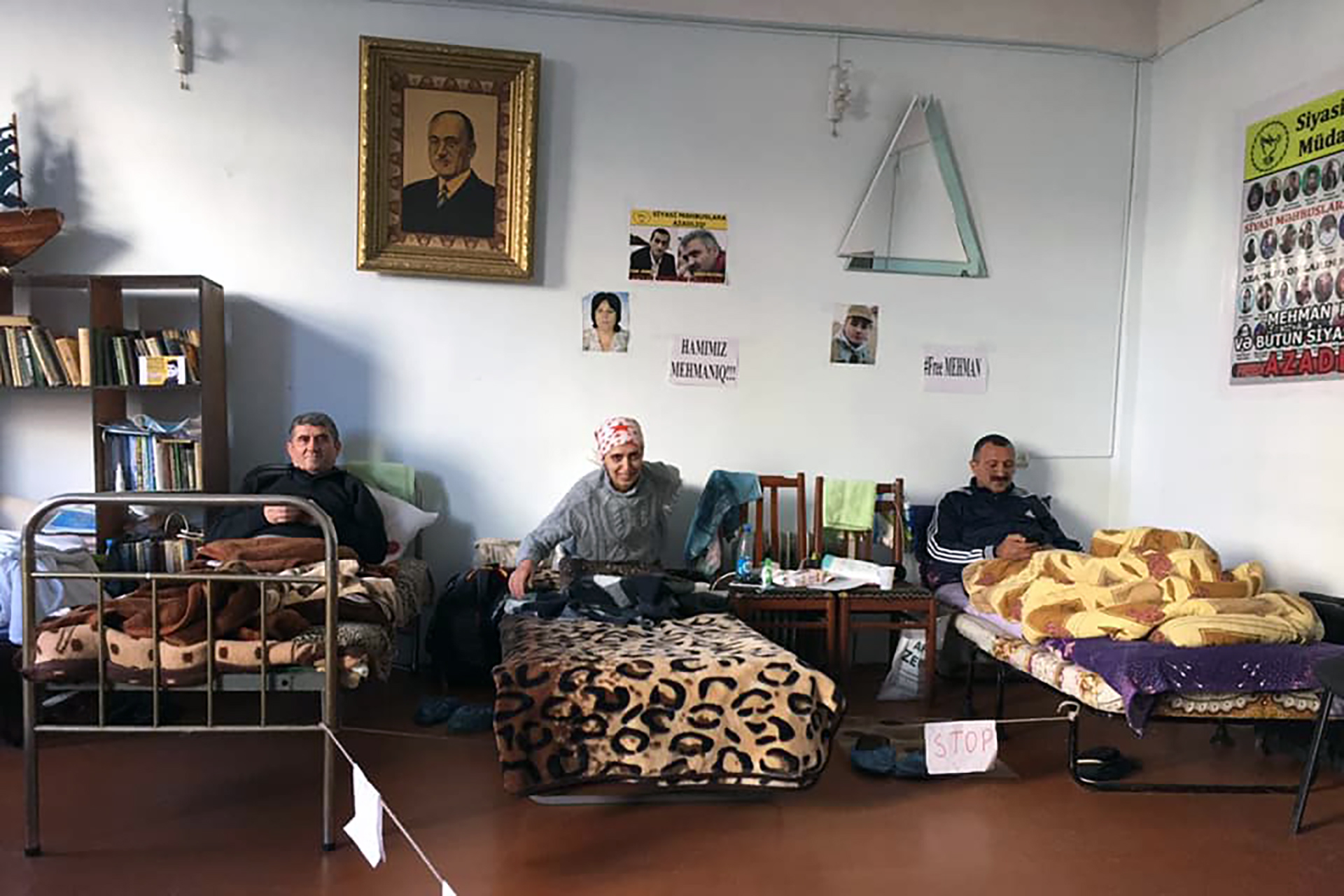
At least 20 people both in prison and on the outside are now on hunger strike in Azerbaijan in protest against political prosecutions in the country, local activists say.
Nine people being held in Azerbaijani prisons joined announced they had joined the strike on 14 January, informing their families in a joint letter sent from prison.
They have been joined outside prison by opposition politicians, activists, and journalists, including investigative journalist Khadija Ismayilova.
The hunger strikes began when on 26 December, Mehman Huseynov, an anti-corruption blogger and head of local rights group the Institute for Reporters’ Freedom and Safety (IRFS), announced he was no longer eating.
Huseynov announced his decision after new charges of ‘injuring a prison officer’ were brought against him just two months before he was due to be released.

Huseynov was sentenced to two years in prison in March 2017 for libelling the police after claiming three months earlier that officers had beaten him and demanded he stop his anti-corruption activities.
‘We protest against the darkness of our country’
In the letter sent from prison, the nine prisoners denounced what they said was injustice and repression in Azerbaijan.
‘The process that was being started against political prisoners and dissidents at liberty, that climaxed in bringing new charges against Mehman Huseynov, demonstrate the fact that our country has stepped forward to a point of no return’, says the letter.
In their statement, the prisoners said they had planned to begin their strike sooner but had been slowed by receiving contradictory information from prison staff.
‘We protest against the darkness of our country! We protest against repression and we will not keep silent! We will own our country and will resist that its brightest people are being treated like gangsters in prisons!’, the statement ends.
Shura Amiraslanova, whose son Giyas Ibrahimov was among the letter’s signatories, told OC Media her son had informed her he had joined Huseynov on hunger strike during a visit on 3 January.
Ibrahimov was arrested in May 2016 for writing anti-government slogans on a monument to Heydar Aliyev in Baku. Five months later, he was sentenced to 10 years in prison on drug charges that Amnesty International and others say he was tortured into confessing to.
‘Giyas told me: “Mother, we have to do something. Because we will all face the same injustice that is being done towards Mehman. What’s the difference, anyway, we are dead people here, spending our life in prison because of injustice. Therefore, we are starting a death strike” ’, said Amiraslanova.
In a statement to Azerbaijani news site Qafqazinfo on Tuesday, the Azerbaijani Penitentiary Service outright denied that a prison hunger strike was taking place.
‘No detainee in a detention cell or in prisons [in Azerbaijan] is undergoing a hunger strike. The information about prisoners’ hunger striking does not reflect reality, it is aimed at creating confusion in society and keeping certain people on the agenda’ the statement said.
‘I know no other way of fighting’
Khadija Ismayilova a veteran Investigative journalist and member of the Organized Crime and Corruption Reporting Project (OCCRP), also announced she was joining the hunger strike from Tuesday.
Ismayilova told OC Media she was joining the strike with three demands: to drop the new charges against political prisoners currently in detention, to release detainees arrested for exercising their freedom of speech and expression, and for the government to adopt a policy of holding no political prisoners.
‘At least 10 journalists in Azerbaijan are political prisoners, and two chief editors have been charged with filthy allegations against them. Their mothers are in danger of being arrested’, she said.
‘Poet Tofig Hasanli was arrested for writing a poem criticising the Aliyevs. Giyas Ibrahimov and Bayram Mammadov were arrested for writing on a statue of Heydar Aliyev. Besides them, Ilkin Rustamzada has been in prison for five years for organising rallies against corruption’, Ismayilova told OC Media.
She said that recent trends showed that they may not be released after serving their sentences. This tactic, she said, had recently been used against five other prisoners.
‘After other political prisoners joined the hunger strike, I thought there was no excuse not to show solidarity. I know no other way of fighting’, she added.
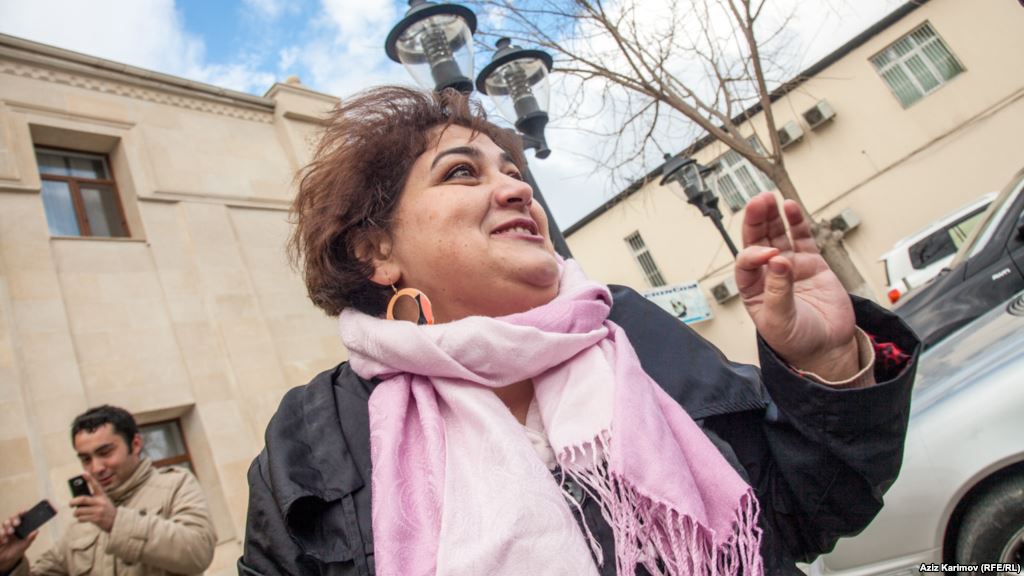
Tofig Yagublu, an opposition politician from the Musavat Party who was detained on charges of organising riots in Ismayilli in 2013, said he had been drinking only water for 12 days.
Yagublu, who was released in a presidential amnesty in 2016, announced he would begin a dry hunger strike as of Tuesday. Five other party members are on hunger strike along with him.
Ogtay Gulaliyev, chair of local rights group the Centre for the Protection of Political Prisoners (CPPP), told OC Media there were currently around 20 people involved in the hunger strike.
‘After Mehman Huseynov started his hunger strike, 10 people who joined the strike to support him were subjected to administrative detention. There are journalists and activists and party members among them. At present, nine people are in prison, and 11 joined the hunger strike at liberty’, said Gulaliyev.
‘We are not successful enough’
Elman Fattah, political commentator and member of the Musavat party, told OC Media that the recent events showed that there were no legal instruments left in Azerbaijan to challenge politically motivated convictions.
‘Unfortunately, the institution of jurisprudence has been completely destroyed’
According to him, political prisoners were previously released periodically in amnesties due to international pressure, ‘but now the number of repressions has increased’.
‘In the current situation, those imprisoned on political motivations are charged with more serious crimes, their names no longer appear on the amnesty list’, Fattah said.
In their letter from prison announcing the hunger strike, the prisoners said that they no longer had confidence in the West, especially in international organisations, to help them.
According to Journalist Khadija Ismayilova, ‘unfortunately, Azerbaijan is still not a region that the world is concerned about, and our problems are still not important’.
‘I thought if my joining the strike would also somehow help to attract the world’s attention to the problem, to help to solve it, I should do it’, she added.
Ismayilova spent three and a half years in prison convicted of tax evasion. Her imprisonment gained widespread coverage outside Azerbaijan, with the charges against her widely condemned by international rights groups as well as the EU, US State Department, OSCE, and others.
Marc Behrendt, Director for the Europe and Eurasia programmes at American rights group Freedom House, told OC Media that he could not say their efforts to protect political prisoners in Azerbaijan had been successful.
‘We don’t deny that it’s difficult to protect the rights of political prisoners. In general, the government takes responsibility for the rights of its citizens, and if it does not do so, it has a limited capacity to prosecute them.’
‘Taking into account the current situation with political prisoners in Azerbaijan, we can say that we are not successful enough’.
Behrendt added that the international community must continue to put pressure on governments to fulfil their commitments on human rights.
International response
International rights groups including Amnesty International, Human Right House, and Reporters Without Borders have accused the Azerbaijani government of falsely imprisoning Huseynov and have demanded his immediate release.
On 7 January, the Council of Europe’s Commissioner for Human Rights, Dunja Mijatović, called on the Azerbaijani authorities to drop new charges against Huseynov as they ‘lack credibility’.
In a tweet on 4 January, Florida Senator Marco Rubio, a member of the US Senate’s Foreign Relations committee, called charges against Huseynov ‘trumped up’ and also called for him to be released.
Azerbaijani blogger Mehman Huseynov remains imprisoned on trumped-up charges. He now is in critical condition due to a hunger strike. The government of Azerbaijan should release him immediately. #ExpressionNOToppression pic.twitter.com/cZ27nIIIiQ
— Senator Rubio Press (@SenRubioPress) January 4, 2019
The French Foreign Ministry has also called for his release.
‘Political prisoners’ in Azerbaijan
International rights groups like Human Rights Watch, Freedom House, and Amnesty International have frequently condemned Azerbaijan’s human rights record.
In July 2018, the European Parliament voted against ratifying any comprehensive agreement with Azerbaijan as long as the country ‘does not respect fundamental EU values and rights’.
The resolution listed Mehman Huseynov, who first began the hunger strike, alongside Ilgar Mammadov, Afgan Mukhtarli, Ilkin Rustamzada, Seymur Haziyev, Rashad Ramazanov, Elchin Ismayilli, Giyas Ibrahimov, Bayram Mammadov, Asif Yusifli, Fuad Gahramanli, Khadija Ismayilova and Intigam Aliyev as ‘emblematic cases’ of restricting political freedoms.
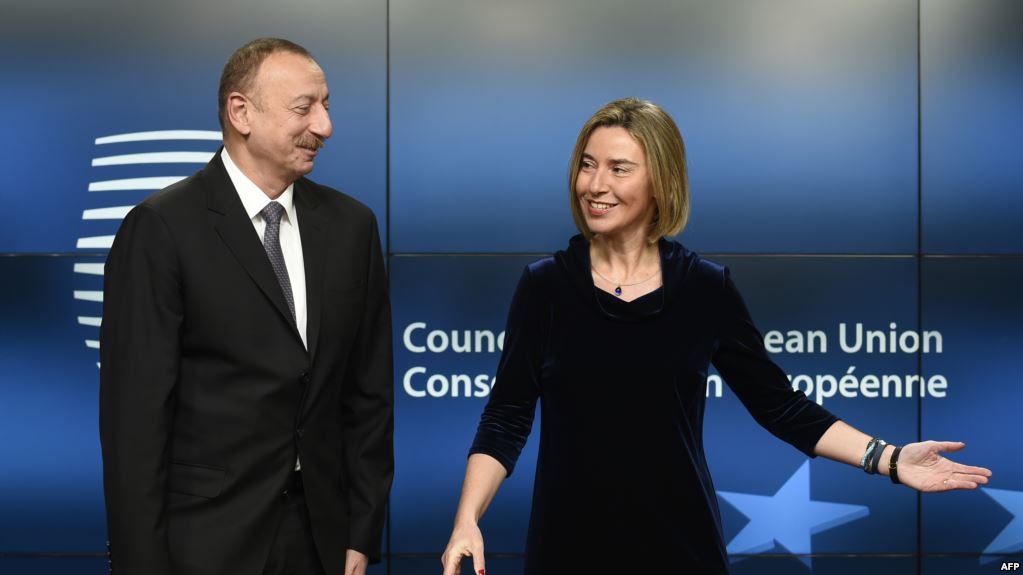
In its 2018 report, Human Rights Watch said that during a continuing crackdown on independent voices, Azerbaijani authorities convicted at least 25 journalists and political activists last year, while dozens more were detained or are under criminal investigation, face harassment and travel bans, or have fled.
Freedom House’s Nation in Transit 2018 report named Azerbaijan as one of ‘Eurasia’s entrenched autocracies — [where] personalised regimes keep a tight grip on power, suppressing political competition and targeting independent activists and journalists who dare to speak out’.
